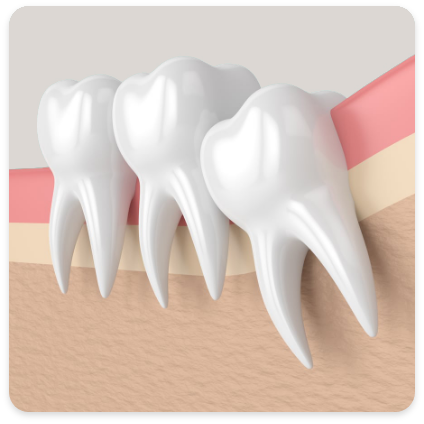What are the types of oral surgeries?
Here are some of the most common types of oral surgeries:
- Dental implants. An implant is a titanium screw fused into the jawbone to replace the tooth roots. It serves as a sturdy and long-lasting anchor for the replacement tooth. This surgery can take several months to complete as the implant must integrate into the jawbone first. Once completed, implants can restore your chewing and speech abilities and improve the quality of your life.
- Wisdom tooth extraction. Wisdom tooth extraction involves a back molar. The wisdom teeth erupt last. So, sometimes, there’s not enough room to accommodate them. They come in slanted, erupt partially, or get trapped beneath the gums. These can all lead to discomfort, pain, or infections, that’s why dental professionals recommend removing the affected tooth. In some instances, impacted wisdom teeth are extracted as a preventative measure.
- Bone grafting. A dental bone graft procedure increases jaw bone density. Your dentist may recommend it if you wish to receive an implant or dentures, but there isn’t enough jaw bone in the area. Dental bone grafting is a common procedure. The area is numbed, and your dentist makes an incision in your gums. The gums are slightly moved back, the bone grafting material is inserted, and the area is covered with a membrane for protection. The gum is then repositioned, and the incision is closed.
- Gum grafting. Also referred to as periodontal plastic surgery, gum grafting addresses gum recession or tooth root exposure. Gums can recede due to gum disease, poor oral hygiene habits, and tartar buildup. A tissue is taken from the roof of your mouth and then moved to the treatment area. The area is numbed, prepared, and cleaned. Then, the tissue is collected and moved over. Afterward, the gum is repositioned and stitched close.
Why is oral surgery performed?
There are several reasons why oral surgery may be necessary, including the following:
- Severely damaged teeth
- Significant loss of jaw bone
- Impacted teeth
- Severe tooth decay
- Missing teeth
During routine oral examinations, your dentist evaluates your mouth and related structures. They look for signs of potential issues and see if there’s a need for corrective dental procedures or oral surgery.
Do I need oral surgery
The parts of the mouth work together to allow proper function and maintain good oral health. Any issue that keeps any of these parts from functioning can impact your dental health and general health. If you notice any irregularity or persistent pain in your mouth, don’t ignore it. See your dental care provider immediately for a comprehensive assessment.
Learn more about getting oral surgery in Little Italy, Toronto, ON
Modern dental technologies and techniques allow dental professionals to perform procedures in a minimally invasive way or in a much more comfortable manner.
If dental fear or anxiety keeps you from showing up for your dental appointments, let your dental team know. They can develop a plan with you to make your visits a pleasant experience.
For more information about oral surgery in Little Italy, Toronto, Ontario, contact us at Little Italy Dentistry. Find out if you or a family member needs it, beginning with an oral examination. Speak with one of our team members to schedule your initial consultation with the dentist.







